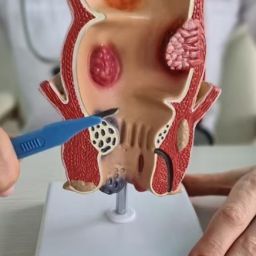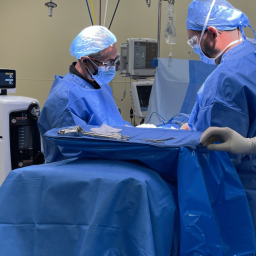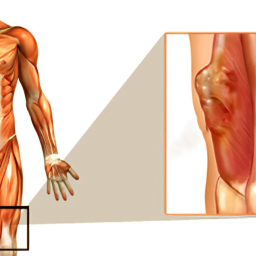
1. The Importance of Proctological Health Awareness
Proctological health encompasses a range of conditions affecting the digestive tract, including the anus, rectum, and colon. These conditions can be both painful and debilitating, yet they often go undiagnosed because of the social stigma associated with discussing matters related to the anus and bowels. The lack of awareness can lead to delayed diagnoses, worsening symptoms, and a reduced quality of life.
1.1 Common Proctological Conditions
Some of the most common proctological conditions that affect individuals include:

- Hemorrhoids: Swollen blood vessels in the rectal area, often caused by excessive straining during bowel movements.
- Anal Fissures: Small tears in the skin around the anus, usually caused by passing hard stool or constipation.
- Colorectal Cancer: A type of cancer that affects the colon and rectum, which can be fatal if not detected and treated early.
- Inflammatory Bowel Disease (IBD): Chronic inflammatory conditions, such as Crohn’s disease and ulcerative colitis, that affect the gastrointestinal tract.
- Pelvic Floor Dysfunction: A condition where the muscles of the pelvic floor become weakened, leading to issues such as incontinence or difficulty with bowel movements.
While these conditions are common, they remain a sensitive subject for many people to discuss. As a result, there is often a lack of awareness about their symptoms, causes, and the potential for prevention and treatment.
1.2 Barriers to Seeking Help
The stigma associated with proctological health issues is a significant barrier to early diagnosis and treatment. Many individuals feel embarrassed or ashamed to discuss symptoms related to bowel movements or anal discomfort, which can prevent them from seeking medical help. This is especially true in cultures where discussions around bodily functions are seen as taboo. Other barriers include:
- Lack of Knowledge: Many people are not aware of the symptoms of proctological conditions or the importance of early intervention.
- Fear of Diagnosis: Some individuals avoid seeking help due to fear of being diagnosed with a serious condition, such as colorectal cancer.
- Cultural Taboos: In certain cultures, discussing bowel health or visiting a doctor for proctological concerns is seen as uncomfortable or inappropriate.
Addressing these barriers is key to improving proctological health outcomes. Community-based approaches can help bridge this gap by providing education, support, and a platform for open discussions.
2. Community-Based Approaches to Proctological Health Awareness
Community-based initiatives focus on engaging individuals at the local level, providing education, and fostering a culture of openness around proctological health. These approaches can be tailored to different communities, considering cultural, social, and economic factors. The goal is to increase awareness, reduce stigma, and encourage individuals to seek help when needed.
2.1 Public Health Campaigns
Public health campaigns are one of the most effective ways to raise awareness about proctological health issues. These campaigns use various media, including television, radio, social media, and printed materials, to reach a wide audience. Campaigns can provide information about common proctological conditions, encourage regular screenings, and promote early intervention.
- Targeted Messaging: Campaigns should be tailored to address specific conditions, such as colorectal cancer or hemorrhoids, and should emphasize the importance of prevention, early detection, and treatment.
- Reducing Stigma: To combat the shame and embarrassment associated with proctological health issues, campaigns must promote a message of normalization. Encouraging individuals to talk openly about their symptoms can help reduce stigma and empower people to seek help.
- Highlighting Success Stories: Featuring testimonials from individuals who have successfully managed or overcome proctological health issues can encourage others to take action.
2.2 Educational Workshops and Seminars
Community workshops and seminars provide a more interactive way of educating the public about proctological health. These events can be organized by healthcare professionals, local health organizations, or community centers and can include a variety of formats such as presentations, Q&A sessions, and demonstrations.
- Healthcare Professional Involvement: Healthcare professionals, such as gastroenterologists and colorectal surgeons, can lead these workshops, offering expert advice and answering common questions.
- Practical Advice: Workshops can provide attendees with practical tips on maintaining digestive health, recognizing symptoms, and seeking medical care.
- Support Networks: These events can also provide opportunities for individuals to connect with others who are dealing with similar conditions, offering emotional support and sharing coping strategies.
2.3 School and Workplace Initiatives
Raising awareness about proctological health in schools and workplaces is crucial for reaching a broad demographic, especially young adults and working individuals who may be unaware of the importance of digestive health.
- School Programs: Schools can incorporate digestive health into their health education curriculum, teaching students about the importance of regular bowel movements, hydration, and recognizing early symptoms of proctological conditions.
- Workplace Wellness Programs: Employers can incorporate proctological health into workplace wellness initiatives, offering resources, screenings, and support for employees dealing with proctological conditions. This is especially important in industries where long periods of sitting or physical strain may exacerbate conditions like hemorrhoids.
2.4 Support Groups and Peer Networks
Support groups and peer networks provide individuals with a safe space to discuss their experiences with proctological health. These groups are often led by people who have experienced similar health issues, offering an empathetic and nonjudgmental environment where individuals can seek advice and emotional support.
- Online Support Groups: Online forums and social media groups can provide a sense of community for individuals dealing with proctological conditions. These platforms allow individuals to connect with others, share their experiences, and access valuable information about managing their health.
- Local Support Groups: In-person support groups can foster a sense of solidarity and empowerment, where individuals can learn from each other and gain confidence in discussing their health issues.
3. The Role of Healthcare Providers in Community-Based Awareness
Healthcare providers play an essential role in community-based awareness initiatives. Physicians, nurses, and other healthcare professionals can contribute to raising awareness through direct patient interactions, public speaking engagements, and collaborations with community organizations.

3.1 Promoting Early Screenings and Checkups
Healthcare providers can actively encourage individuals to undergo regular screenings for colorectal cancer and other proctological health conditions. Early detection is crucial in improving outcomes for conditions such as colorectal cancer, which can be treated effectively if caught early.
- Routine Checkups: Healthcare professionals can remind patients about the importance of routine checkups, especially for individuals over the age of 50 or those with a family history of gastrointestinal conditions.
- Screening Programs: Community-based screening programs, in which healthcare providers collaborate with local organizations to offer free or low-cost screenings, can help detect conditions in the early stages when treatment options are most effective.
3.2 Building Trust and Reducing Stigma
Healthcare providers have the unique ability to build trust with patients, which can help reduce the stigma associated with proctological health issues. By offering compassionate, nonjudgmental care, healthcare providers can make patients feel more comfortable discussing their symptoms and concerns.
- Confidentiality: Ensuring patients that their information will be kept confidential can help alleviate concerns about discussing sensitive issues.
- Patient Education: Healthcare providers should take the opportunity to educate patients about common proctological conditions, the importance of lifestyle changes, and when to seek professional help.
4. Measuring the Impact of Awareness Campaigns
To determine the effectiveness of community-based awareness efforts, it is essential to evaluate the impact of campaigns and initiatives. This can be done through surveys, follow-up studies, and monitoring health outcomes.
- Pre- and Post-Campaign Surveys: Surveys can be conducted before and after awareness campaigns to measure changes in public knowledge, attitudes, and behaviors related to proctological health.
- Health Outcomes: Tracking health outcomes, such as increased screening rates or reduced hospitalizations for conditions like colorectal cancer, can help evaluate the success of awareness efforts.
Raising awareness about proctological health is crucial for improving public health outcomes and reducing the stigma surrounding conditions like hemorrhoids, colorectal cancer, and IBD. Community-based approaches provide an effective way to engage individuals, educate the public, and foster open discussions about these often-overlooked conditions. By reducing barriers to seeking help, promoting early diagnosis, and encouraging healthier lifestyle choices, community initiatives can play a pivotal role in improving proctological health outcomes.
Healthcare providers, public health organizations, and local communities must work together to ensure that proctological health is recognized as an essential aspect of overall well-being. Through education, support, and early intervention, we can empower individuals to take control of their digestive health and live healthier lives.







